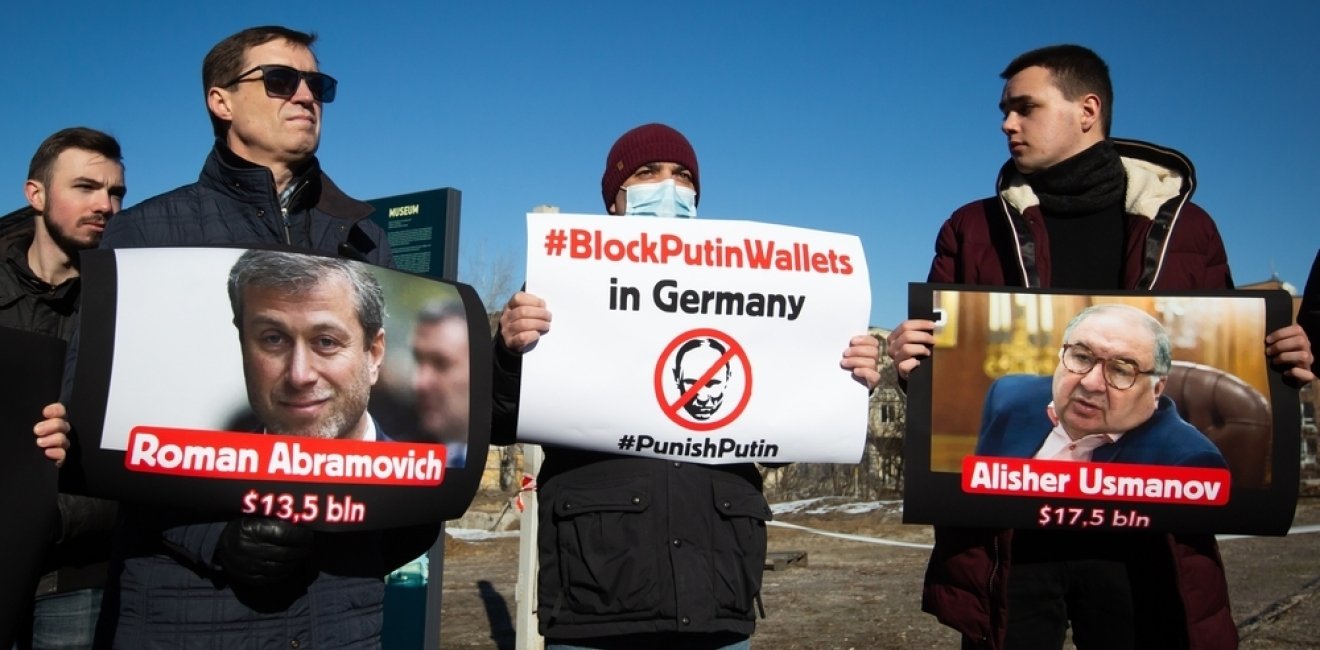
A blog of the Kennan Institute
The debate over whether sanctions against the Russian oligarchs are useful or useless has been going on since the beginning of the war, when most of the sanctions were imposed. But the idea of exerting pressure on big Russian businesses in order to influence Russian domestic and foreign policy appeared much earlier.
The rationale for imposing sanctions on large businesses close to the state was as follows: the oligarchic businesses not only benefit from proximity to the government, they also inform the oligarchs’ close relationship with the authorities. This means that the oligarchs could potentially influence the government and personally influence Putin in the case of any significant sanctions being imposed on them. A deep dive into the entanglements of big business with Russia’s security and administrative agencies suggests the oligarchs are not yet prepared to take this route.
Big Businessman or Oligarch?
The leaders and various groups of the Russian opposition have long proposed putting pressure on Putin by sanctioning big businessmen. However, prior to Russia's large-scale war against Ukraine, sanctions were imposed on a limited and case-by-case basis. The U.S. Global Magnitsky Act, which allows sanctions to be levied against individuals who have committed human rights abuses or engaged in significant corruption, contributed to the success of the earlier sanctions.
It is obvious that sanctions worry the Russian elites. Boris Nemtsov, who did much to promote the sanctions policy in the West, was killed back in 2015, and Vladimir Kara-Murza, who was also involved in this process, was poisoned twice. He has now been convicted of treason by a Russian court and sentenced to twenty-five years in prison.
The cautious position of the West on this issue is understandable: the entire Western legal culture is based on respect for private property and free enterprise (but not oligarchy). It is difficult to understand who is an oligarch and who is a big businessman, especially for observers who are not immersed in the realities of Russian life. This blurring of category was actively used by defenders of the interests of pro-government Russian businesses in the international arena, who repeatedly declared them to be ordinary businesses that had nothing to do with the government.
An even more difficult problem for the Western legal system is drawing the line between those who really own a business and those to whom it is registered, as well as discerning the involvement of family members of officials and oligarchs, especially when adult children, ex-wives, and distant relatives appear on the horizon.
But is it possible to get the sanctioned businessmen to put pressure on Putin? Do they have the means to do so?
Isolation of the Leader Forces a Recalibration
At least until the beginning of the COVID-19 epidemic, Putin periodically communicated with various oligarchic groups both formally and informally. This was the basis of the belief of Putin’s critics that if sanctions against the oligarchs had been imposed immediately after the occupation of Crimea, their effectiveness would have been much higher owing to the circumstances described above.
The COVID-19 epidemic greatly complicated communication between Putin and the outside world. Even three years after the start of the pandemic, when most of the restrictive measures have been lifted, Putin continues to live in strict isolation. This way of life implies, above all, no unplanned-in-advance or chance meetings. If a big businessman wants a meeting with Putin, he has to sign up for it in advance and observe a two-week quarantine. Naturally, if Putin for some reason does not want to have a one-on-one meeting with this person, then no one has the means to impose such a meeting.
It is precisely the lack of any practical way to exert influence on Putin that has been pointed out by the sanctioned businessmen who are seeking the lifting of sanctions. One of the most active voices in this chorus is that of Mikhail Fridman, co-owner of the Alfa Group conglomerate.
Fridman and his group have been very active in seeking to have the sanctions lifted, and have even made contact with a number of opposition figures, proposing that the latter write letters in support of the idea. Unfortunately, some of the opposition figures agreed to this arrangement, while one of the co-owners of Alfa Group, German Khan, was at Putin’s last public meeting with big businesses just recently.
But is it correct to think that removing sanctions from the oligarchs would allow them to do something to change the situation in Russia? And should we believe Friedman’s claims that he can do nothing, and that therefore sanctions are useless?
That Friedman has already engaged in the trade for the removal of sanctions should be interpreted not as the final stage of the process but as its beginning. Friedman’s concern means that the sanctions are working and that big businesses around the country is beginning to have more and more problems. Consequently, it is necessary not to reduce the pressure but to increase it and to impose new sanctions, preferably personal ones, so that as many of Putin’s business and bureaucratic elite as possible would have to think seriously about their future.
Personal Sanctions Can Work—Eventually
But can the oligarchs have any influence on Putin if he no longer speaks to them? Here it is important to understand that the role of big business in Putin’s power is not limited to business owners’ personal ties to Putin. Every business empire had a vast network of dependents in the security and administrative agencies. And if every Putin oligarch who has fallen under sanctions is forced to activate his entire network of contacts and, above all, his dependents in the security and administrative agencies, this could create the preconditions for the long-awaited split of the elites and the overthrow of Putin as the result of a coup.
Unfortunately, we currently see limited efforts by sanctioned Russian oligarchs to preserve their wealth and business empires. These efforts mostly involve attempting to bargain with the Western elites. Therefore, it is crucial that the Western elites reject any proposed compromises and increase pressure on the oligarchs. If these oligarchs face an existential threat to their business, wealth, and future, they will have no choice but to try to bring about change in Russia by using their informal influence in power and administrative circles. If they choose to risk losing everything in the West in order to preserve their relationship with Putin and his regime, that outcome could also be considered favorable.
It is evident that the wealthiest individuals in Russia, who amassed their fortunes through the collaboration and support of the government, are unwilling or unable to oppose Putin despite their considerable wealth, connections, and resources. Therefore it is imperative to acknowledge that they cannot yet be considered as an alternative to Putin but rather as an integral part of his system. Consequently, the presence of Russian oligarchic capital and big business figures in the West who do not oppose Putin poses a threat to Western economies and democracy.
Western elites need not be concerned that the problems affecting big businesses and the sanctions imposed on them are undermining capitalism and the market economy in Russia. In fact, pro-government businesses have done more harm than good, as they have hindered the creation of a fair and competitive market economy in Russia. On the other hand, there are entrepreneurs of all sizes who have successfully created and developed their businesses despite the government and oligarchic interventions. They will receive even more incentives to grow if the issues of unfair competition and corruption are resolved within the Russian business environment.
The opinions expressed in this article are those solely of the author and do not reflect the views of the Kennan Institute.
Author

Kennan Institute
The Kennan Institute is the premier US center for advanced research on Eurasia and the oldest and largest regional program at the Woodrow Wilson International Center for Scholars. The Kennan Institute is committed to improving American understanding of Russia, Ukraine, Central Asia, the South Caucasus, and the surrounding region through research and exchange. Read more

Explore More in The Russia File
Browse The Russia File
Chechnya as a Model of Modern Russia

Russia’s Indigenous Communities and the War in Ukraine

Gas and Power in a Changing US–Russia Relationship


